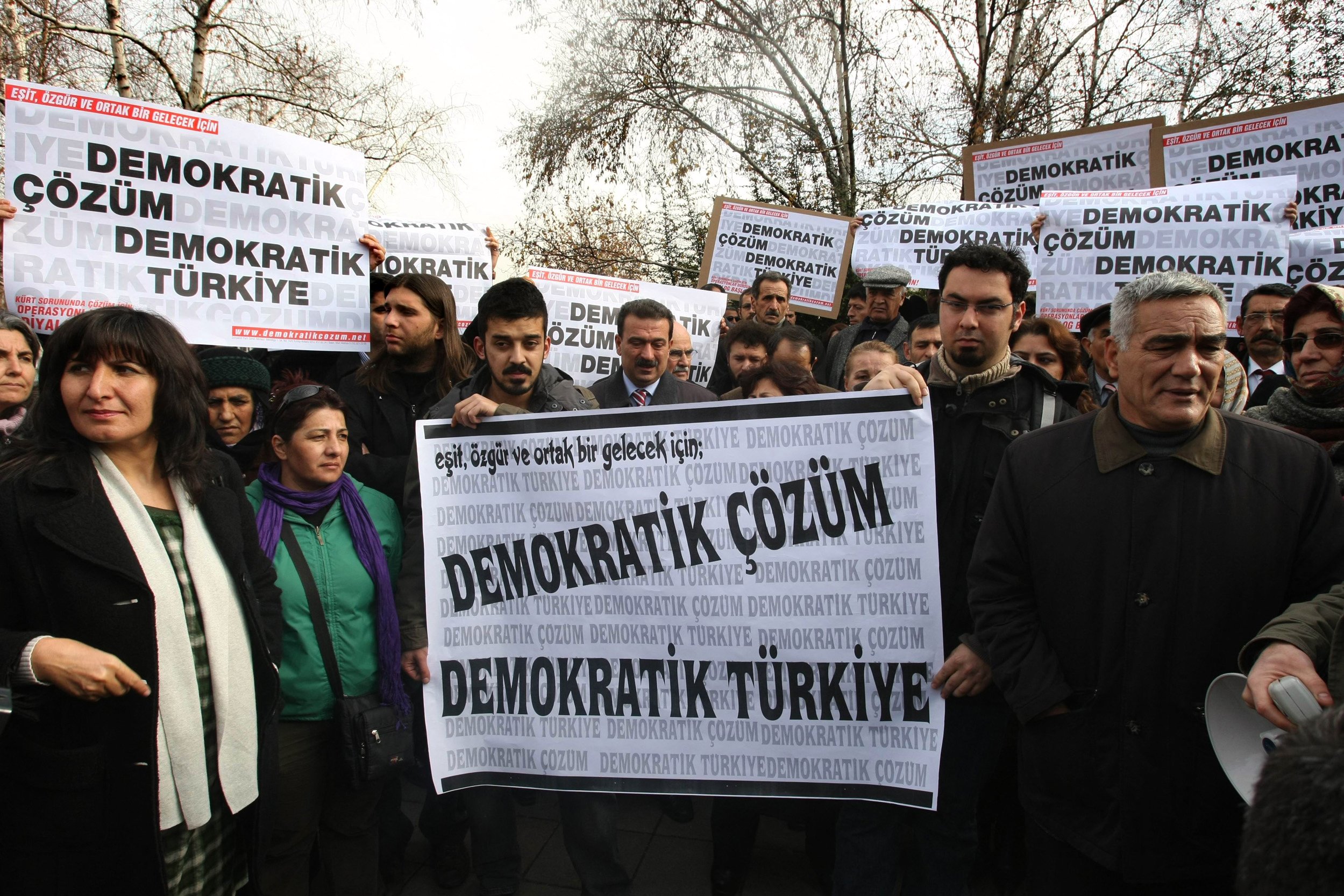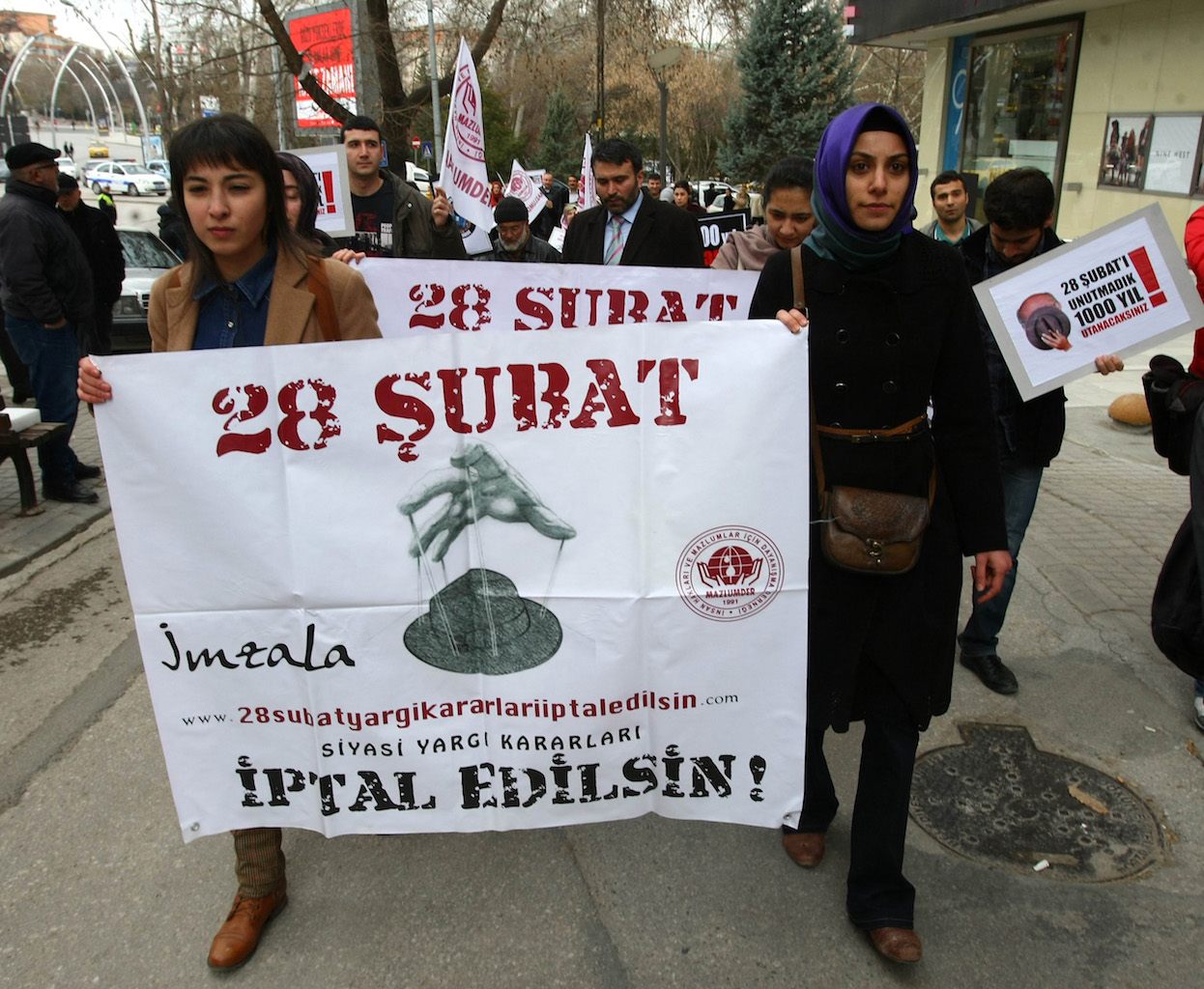In 1998, the Constitutional Court of Turkey closed down the Welfare Party, at the time the largest in parliament, with chief justice Ahmet Necdet Sezer citing the party’s “actions against the principles of the secular republic”.
The move was condemned internationally, including by Washington, which called on its Nato ally to “enhance democracy” and allow a wider spectrum of political participation.
The party’s leader, Necmettin Erbakan, a stalwart of Turkey’s religious conservatives who had previously held the position of prime minister, said the closure would rebound on its opponents, only spurring on their supporters’ determination.
‘As a political entity we may not be able to survive this onslaught on our party, but definitely as a people, as a movement, we are going to survive’
– Hisyar Ozsoy, HDP
“Whenever they put obstacles in our path, our support only increases,” he said at the time.
Twenty-three years later, his protege Recep Tayyip Erdogan – once the Welfare Party mayor of Istanbul and now president – is facing criticism from the other side of the fence, as his hand-picked chief public prosecutor applies to close down the left-wing, pro-Kurdish Peoples’ Democracy Party (HDP).
The Welfare Party and the HDP are far from the only parties shut down by the state in Turkey’s history.
Since the founding of the republic in 1923, the country’s constitutions have always limited political pluralism to one degree or another.
Left-wing parties, Communist ones, those supporting various minority groups, and Islamist movements, have all been subject to closures and bans over the past century. Just since the adoption of the 1982 constitution, almost 20 parties have been forcibly closed.
‘Onslaught on our party’
The indictment being levelled against the HDP this time, however, is somewhat different: it calls not only for the closure of the party but for the banning of 687 political figures associated with it.
Hisyar Ozsoy is an HDP MP in the party’s core base of Diyarbakir, and his name is one of those listed in the indictment to be banned from political office.
He told Middle East Eye that the party’s central board was examining a number of options for the upcoming parliamentary elections – set for 2023, but possibly occurring earlier – should the application to the Constitutional Court be successful.
“It may be another political party, it may be independents, using the list of an already existing party,” he said, via phone.
“These are all options, but they may even try to prevent the HDP from running as a different political party.”
Noting the repeated obstacles that have been thrown in the way of progressive political parties in Turkey in the past, he said that, regardless of what happened, the HDP as a movement would not disappear.
“The HDP is not just some headquarters, some building, some people. We do have a powerful historical tradition of diverse struggles in Turkey,” he said.
“So they may shut down the HDP as a political entity, but the political struggles that we represent are going to stay there and will be impacting Turkish and Kurdish politics in the country.
“As a political entity we may not be able to survive this onslaught on our party, but definitely as a people, as a movement we are going to survive.”
A history of closures
When the ruling Justice and Development Party (AKP) came to power under Abdullah Gul in 2001 (due to Erdogan still being banned from political office), it pledged that there would be an end to the era of forced party closures, not least because of its own roots in the forcibly closed Welfare Party and the enduring fear it might be subjected to similar treatment.
Mustafa Akyol, a writer and senior fellow at the Cato Institute, said he had once been optimistic about the AKP as a force for ending the authoritarian practices of the Turkish state.
“In its early years in power, Erdogan’s AKP was boldly against all the illiberal and anti-democratic features of the regime of ‘Old Turkey’,” he told MEE.
“But in a mind-boggling turn, once they consolidated power, their ‘New Turkey’ began repeating – in fact, often doubling – all the authoritarian habits of the past.”
The forcible closure of political parties in Turkey has a history dating right back to the early years of the republic.
The Communist Party of Turkey (TKP) was one of the first victims in 1925, despite the crucial role the Bolsheviks had played in helping establish the republic. Semyon Ivanovich Aralov, Soviet ambassador to Turkey, is among those displayed on the victim monument in Istanbul’s Taksim Square.
Until the 21st century, political parties with the word “Communist” in their name were effectively banned in Turkey, though many operated illegally or used alternative monikers.
Further right on the political spectrum, the Liberal Republican Party was founded in August 1930 as an early attempt at multi-party democracy at the insistence of republic founder Mustafa Kemal Ataturk, but was swiftly closed in November that same year after it drew too many elements opposed to Ataturk’s secular-nationalist reforms.
Unlike later closures, the party was shut down by its founder rather than forcibly closed, but it left the country as a one-party state under the Republican People’s Party (CHP) at the end of the Second World War.
Since that period, the Turkish state has repeatedly banned parties from across the political spectrum: on the one hand, Communists over their internationalism, atheism, anti-capitalism and opposition to US influence in Turkey; on the other hand, Islamists, whose desire for religion-based rule undermined the secular underpinnings of the republic.
Kurdish parties closed
One of Ataturk’s founding principles for the republic was a belief that ethnic and cultural homogeneity would promote stability and peace.
As such, there have long been strict bans on political parties that promote the rights of minorities, which are regularly shut down on the accusation of threatening the territorial integrity of the country.
Parties promoting the interest of Kurds, the country’s largest ethnic minority, have been most regularly subjected to closure, often over accusations of links to the Kurdistan Workers’ Party (PKK) militant group.
Not even counting illegal or extra-parliamentary groups, the list of pro-Kurdish parties closed since the beginning of multi-party democracy is extensive.
In the past 30 years alone, after the first overtly pro-Kurdish politicians began being elected to parliament, the list includes the People’s Labour Party and the Freedom and Democracy Party (DEP) in 1993, the Democracy Party in 1994, the original People’s Democracy Party in 2003 and the Democratic Society Party (DTP) in 2009.
Many of the same people were involved in each party, which were often just re-constituted versions of each other. Many are also members of the HDP, which was founded in 2012 as an alliance between the Kurdish movement and other left-wing parties.
Layla Zana, later an HDP politician, scandalised the country in 1991 when, after taking her oath to be sworn into parliament (and in spite of attempts to drown her out), spoke the line: “I take this oath for the brotherhood between the Turkish people and the Kurdish people” in Kurdish, which was effectively illegal at the time.
She would later be stripped of her parliamentary immunity after the party she was then a member of, the DEP, was banned, and would spend many years in prison.
Zana, who was an HDP MP between 2011 and 2018, is also named among the 687 politicians to be banned from office in the most recent indictment.
The later banning of the DTP – after the Constitutional Court declared it had become the “focal point of activities against the indivisible unity of the state, the country and the nation” – came the same year as the court ended a similar investigation into the AKP, which declared the party had become “a centre for anti-secular activities” but only cut its state funding, rather than banning it outright.
“Closing down pro-Kurdish parties with implicit ties to the PKK was one such habit of ‘Old Turkey’ that the AKP used to criticize,” said Akyol.
“But first they began purging the elected mayors of the HDP, to replace them with their own loyalists.
“Now they are taking the ultimate step, completing the full circle in going back to the ‘Old Turkey’ – or its new version which now they dominate.
“Every fair political observer knows that closing down a party that gets 10 percent of the national vote will not bring any good to Turkey, but it may help boost the ultra-nationalist coalition that Erdogan has built.”
‘Indivisible integrity’ of Turkey
The application made by Bekir Sahin to the Constitutional Court on Wednesday accuses the HDP of threatening the “indivisible integrity” of Turkey and of having an “active role in providing personnel” to the PKK.
The court now has to make a decision on the indictment, but few believe it will issue a decision that goes against the government’s wishes, though it is also possible the eventual decision could stop short of a full closure.
The EU condemned the move on Thursday.

Turkey: Erdogan’s human rights initiative raises eyebrows of beleaguered activists
Read More »
“Closing the second-largest opposition party would violate the rights of millions of voters in Turkey,” EU foreign policy chief Josep Borrell and enlargement commissioner Oliver Varhelyi said in a statement, adding that it “undermines the credibility of the Turkish authorities’ stated commitment to reforms”.
In response, the Turkish foreign ministry told those who “dare to meddle in our domestic affairs to respect the judicial process led by independent courts”.
Regardless of the eventual outcome, Ozsoy said, it was just one more incident in the long struggle for pluralism and representation in Turkey.
“[The government] don’t have anything to offer to the Turkish people as a positive agenda, to resolve the economic crisis or other issues,” he said.
“They are cooking the same dish and trying to serve it to people. Whenever there is a crisis or an unstable situation in the country they consolidate their power base by attacking the HDP.
“Even if Erdogan totally wipes out the HDP, the HDP people are not going to vote for him in the presidential elections… if Erdogan shuts down the HDP, he will totally lose the Kurdish vote.”




